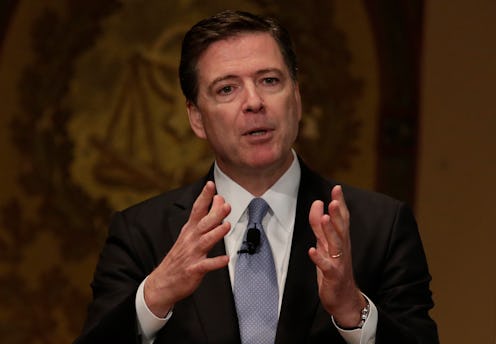In a press conference on Monday, FBI Director James Comey refused to name the Orlando shooter in an effort to avoid making his name famous. He went on to explain that the perpetrator's Port St. Lucie home, as well as his electronic devices, are being searched for any possible leads. According to FBI Ron Hopper, his name was familiar to the bureau, who had investigated him three times between 2013 and 2014.
You will notice that I am not using the killer's name and I will try not to do that. Part of what motivates sick people to do this kind of thing is some twisted notion of fame or glory and I don't want to be part of that for the sake of the victims and their families. And so that other twisted minds don't think that this is a path to fame and recognition.
Before opening fire, the shooter called 911 three times and claimed his allegiance to ISIS during the third call, indicating he wanted his cause, as well as his name, to be known. Though the details of the shooter's personal life must be disclosed to the public, Comey does not intend on attaching a name or face to the atrocity.
This isn't the first time law enforcement officials have refrained from allowing a murderer's name to go down in history. Following the Umpqua Community College shooting on Dec 1, 2015, Sheriff John Hanlin of Douglas County, Oregon also refused to credit the gunman with the nine deaths he caused.
I will not give him the credit he probably sought with this horrific and cowardly act. You will never hear me mention his name.
A similar sentiment inspired an entire campaign called "No Notoriety" after the Aurora, Colorado movie theater shooting in July 2012. Family and friends of the victims joined the campaign, requesting that media stop perpetuating the names of killers and focus on the identities of victims instead. This applies to the use of photographs, as well. Repeatedly having to confront the perpetrator's face, which is oftentimes plastered on television screens and articles, won't change the fact that innocent people lost their lives. Furthermore, it's not helpful to the investigation unless the killer hasn't been detained.
Comey is furthering a principle the FBI has promoted for nearly two years now after Texas State University researchers suggested potential shooters are inspired by the sensationalized stories of past shooters. The resulting campaign "Don't Name Them," developed by Texas State University's ALERRT Center and supported by the FBI, asks that media refrain from naming the killer. As early as July 2014, Chris Combs, special agent at the FBI field office in San Antonio told local KSAT News, "When the media covers it, it unfortunately puts ideas in people's heads."
Arizona State University physicist Sherry Towers explained an adjacent theory called the "contagion effect," that's listed on the "Don't Name Them" campaign's official website.
Our research examined whether or not there was evidence that mass killings appear to inspire copycat killings. We found evidence that killings that receive national or international media attention do indeed inspire similar events a significant fraction of the time.
This may even apply to the Orlando shooting case, in which the killer was allegedly inspired by ISIS.
